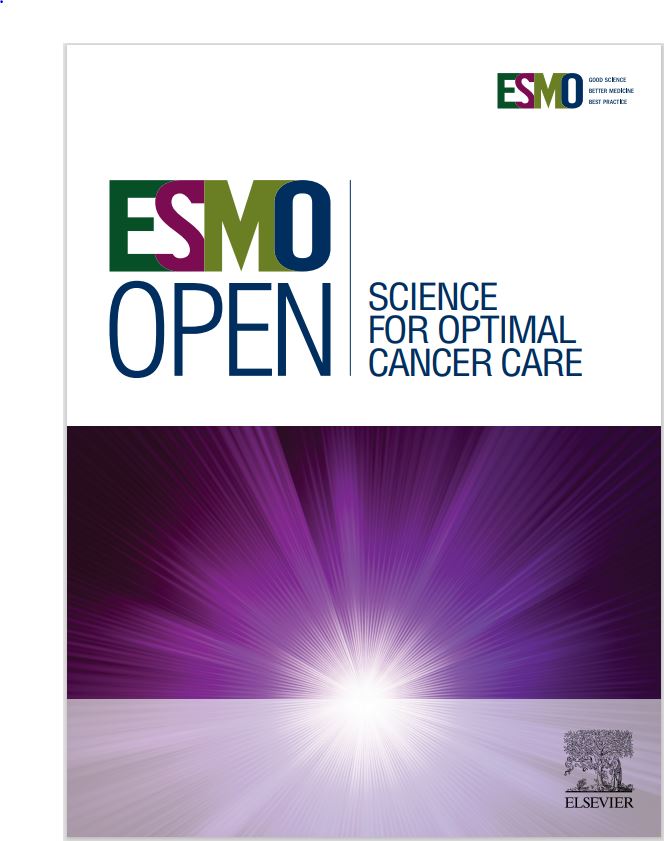Integrated clinico-molecular analysis of gastric cancer in European and Latin American populations: LEGACY project
IF 7.1
2区 医学
Q1 ONCOLOGY
引用次数: 0
Abstract
Background
Gastric cancer (GC) is recognized for intrinsic heterogeneity, although it is similarly approached in Europe and Latin America (LATAM). The LEGACY project aimed to deepen GC molecular understanding through multi-omics analysis in Europe and LATAM GC samples.
Patients and methods
Tumor samples were centrally reviewed for histology, human epidermal growth factor receptor 2 (HER2) expression, and mismatch repair-deficient (dMMR)/microsatellite instability (MSI) status. In addition, we assessed Epstein–Barr virus (EBV) status, programmed death-ligand 1 (PD-L1) combined positive score (CPS), and carried out tissue genomic profiling including tumor mutation burden (TMB) quantification plus targeted transcriptomics for immune microenvironment and cancer cell signaling scores.
Results
In total, 328 GC patients were enrolled. HER2-positive GC and high PD-L1 CPS were more frequent in Europe than in LATAM (9% versus 3% and 15% versus 3%, respectively), whereas EBV was mainly found in LATAM (7%, versus 3% in Europe), and dMMR/MSI tumors were equally distributed (16%). High TMB was enriched in dMMR/MSI and EBV tumors. Mutations in homologous recombination repair (HRR) genes were frequent in both cohorts (24.8% and 14.7% in Europe and LATAM, respectively), and mostly found in dMMR/MSI (63.6%) and intestinal HER2-negative (18.7%) tumors. The prognosis was poor in diffuse HER2-negative GC patients, whose tumors presented an immunosuppressive microenvironment and other distinct pathway activation signatures.
Conclusions
Our findings relate specific molecular alterations of GC tumors from Europe and LATAM to actionable biomarkers for precision cancer therapies. The proposed GC stratification can be implemented in routine care and guide drug development strategies.
欧洲和拉丁美洲人群胃癌的综合临床分子分析:LEGACY项目
胃癌(GC)被认为具有内在的异质性,尽管在欧洲和拉丁美洲(LATAM)也有类似的治疗方法。LEGACY项目旨在通过对欧洲和拉丁美洲GC样品的多组学分析加深对GC分子的理解。对患者和方法进行组织学、人表皮生长因子受体2 (HER2)表达和错配修复缺陷(dMMR)/微卫星不稳定性(MSI)状态的集中审查。此外,我们评估了Epstein-Barr病毒(EBV)状态、程序性死亡配体1 (PD-L1)联合阳性评分(CPS),并进行了组织基因组分析,包括肿瘤突变负担(TMB)量化以及免疫微环境和癌细胞信号转导的靶向转录组学评分。结果共纳入328例胃癌患者。her2阳性GC和高PD-L1 CPS在欧洲比在拉丁美洲更常见(分别为9%对3%和15%对3%),而EBV主要在拉丁美洲发现(7%对3%),dMMR/MSI肿瘤分布均匀(16%)。高TMB在dMMR/MSI和EBV肿瘤中富集。同源重组修复(HRR)基因突变在两个队列中都很常见(在欧洲和拉丁美洲分别为24.8%和14.7%),并且主要在dMMR/MSI(63.6%)和肠道her2阴性(18.7%)肿瘤中发现。弥漫性her2阴性胃癌患者预后较差,其肿瘤表现为免疫抑制微环境和其他明显的途径激活特征。结论我们的研究结果将欧洲和拉丁美洲胃癌的特异性分子改变与可用于精确癌症治疗的生物标志物联系起来。所提出的气相色谱分层可用于常规护理和指导药物开发策略。
本文章由计算机程序翻译,如有差异,请以英文原文为准。
求助全文
约1分钟内获得全文
求助全文
来源期刊

ESMO Open
Medicine-Oncology
CiteScore
11.70
自引率
2.70%
发文量
255
审稿时长
10 weeks
期刊介绍:
ESMO Open is the online-only, open access journal of the European Society for Medical Oncology (ESMO). It is a peer-reviewed publication dedicated to sharing high-quality medical research and educational materials from various fields of oncology. The journal specifically focuses on showcasing innovative clinical and translational cancer research.
ESMO Open aims to publish a wide range of research articles covering all aspects of oncology, including experimental studies, translational research, diagnostic advancements, and therapeutic approaches. The content of the journal includes original research articles, insightful reviews, thought-provoking editorials, and correspondence. Moreover, the journal warmly welcomes the submission of phase I trials and meta-analyses. It also showcases reviews from significant ESMO conferences and meetings, as well as publishes important position statements on behalf of ESMO.
Overall, ESMO Open offers a platform for scientists, clinicians, and researchers in the field of oncology to share their valuable insights and contribute to advancing the understanding and treatment of cancer. The journal serves as a source of up-to-date information and fosters collaboration within the oncology community.
 求助内容:
求助内容: 应助结果提醒方式:
应助结果提醒方式:


